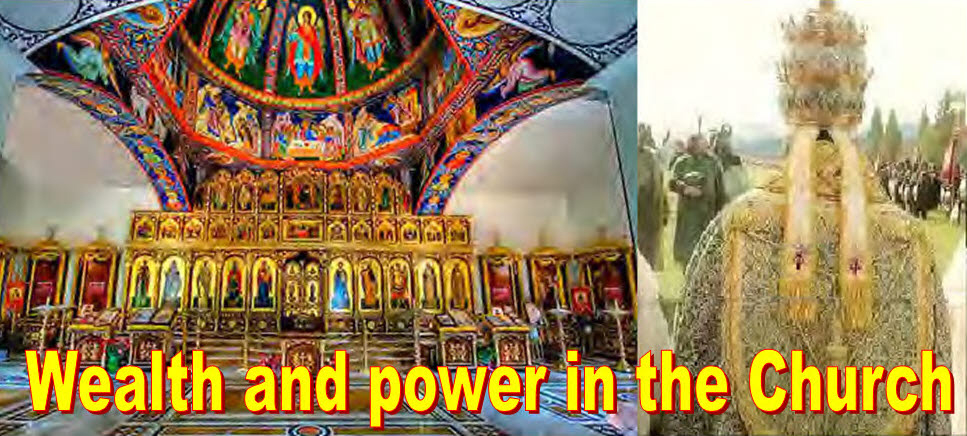









 | 








|
Today, a Christian who chooses to live the Gospel seriously can appear to be an uncomfortable, even suspicious figure. Their commitment to the teachings of Jesus — nonviolence, justice, care for the poor, and rejection of power and consumerism — often provokes discomfort, even within the Church itself. Such a person is seen as strange, as an out-of-place idealist, or worse, as a threat.
This reaction is not random. It has deep roots in the history of Christianity, which began as a persecuted movement and ended up as a powerful institution. Along the way, Jesus’ revolutionary message lost strength. That poor Jesus, friend of the marginalized and critic of religious power, was replaced by a more comfortable, more decorative figure.
Today, those who want to live the Gospel with integrity — choosing the poor, rejecting luxury, seeking justice — face resistance not only from the world but also within the Church. Living like Jesus and asking the Church to resemble Him is a threat to those who prefer a comfortable, system-adapted faith. Authentic Christianity is neither docile nor conformist: it is critical, prophetic, and uncomfortable. The Gospel is not a theory for books; it is an invitation to transform life. In the beginning, Christian faith was born among ordinary people who shared what they had, prayed together, and lived with hope. There were no temples or hierarchies. What mattered was not dogmas but love, justice, and community.
But over time, faith became increasingly intellectual. What was once a way of living was turned into abstract discourses and a series of Byzantine dogmas. Debates raged about the nature of God while real human suffering was forgotten. The Gospel, which should have led to commitment, grew distant from life and became trapped in doctrines that changed nothing. Theology ceased to be a voice close to the people and became an exercise that no longer challenged anyone.
Returning to the Gospel means returning to what’s essential: listening to the poor, sharing life, forgiving, and dreaming of a new world. The Incarnation is not just a belief: it is God becoming part of humanity and its fragility. In Jesus, God is revealed in the small and the everyday. He does not dominate — He accompanies. And that shatters all structures of power.
We can better understand this contradiction by considering the forces that shaped the Church’s history: power and wealth. From the Edict of Milan in the 4th century onward, the Church ceased to be a persecuted grassroots community and became a privileged structure with political and economic influence in the Roman Empire. From that moment, the drive to control, to accumulate wealth, to establish hierarchies and dictate norms from a position of superiority began distancing the institution from the lifestyle Jesus preached and lived. The revolutionary dimension of Christianity was absorbed by an institution that, from the 4th century onward, became intertwined with political and economic power. The decisive change came around the year 370, when the rich and powerful entered the Church en masse. This introduced a logic foreign to the Gospel. The elites, trained in imperial rhetoric and administration, assumed ecclesiastical roles and reorganized the community with hierarchical structures. Thus, Christianity shifted from being a marginal faith to a socially influential institution centered on orthodoxy.
What was once good news for the poor was adapted to the interests of the powerful. This logic persists today. The problem is not just historical: current Church structures often still reflect that model.
The Christian community, which should be a space of service, became an authority over people’s lives. With that transformation came decisions that had little to do with the Gospel: slavery was justified, women were excluded, rigid norms on sexuality were imposed. A doctrine was built that excluded rather than welcomed.
Wealth and power became criteria for exercising authority. Fidelity to Jesus’ message — which calls for service and simple living — was replaced by institutional obedience focused on control. Those who tried to live the Gospel from the margins were silenced because their lives revealed the contradiction between what the Church preached and what it actually practiced.
Returning to the Gospel is a call for radical change. It’s not just about reforms or modernizing language but a deep conversion: listening again to the voice of Jesus, who calls from below, from the excluded. It means breaking with structures that no longer reflect the mission of building God’s Kingdom on Earth and reclaiming a living and committed faith.
In this context, the clergy made decisions that lasted well into the 20th century. From the 8th century on, for example, the prayers of the Mass — the Canon — began to be said quietly and exclusively in Latin, a language no longer understood by the people. It was also during this period that priests began celebrating Mass with their backs to the congregation. The practice of private Masses became widespread: celebrations where a priest officiated alone, without the presence of the faithful or even altar servers, often in small chapels. Thus, the liturgy, originally a communal experience, became an act reserved almost exclusively for the clergy, while the laity were reduced to a passive and obedient role.
At the same time, these liturgical transformations gave rise to an economic system that favored the clergy. In the early centuries of Christianity, the faithful brought offerings to the altar, which were then distributed according to the community’s needs. But with the institutional consolidation of the clergy, these offerings were replaced by monetary payments that laypeople had to make for Masses. This fee-based logic extended to other sacraments and religious rites such as baptisms, marriages, confirmations, funerals, and patron saint festivals.
As a result, practices marked by serious moral opacity arose. One clear example is that of the so-called “Gregorian Masses”: a series of 30 Masses celebrated over 30 consecutive days, with the promise of accelerating the soul’s release from purgatory. The cost of these Masses was significantly higher than that of a regular Mass. To compensate for the lower price of the latter, some priests began celebrating several Masses in rapid succession. Added to this was the even more lucrative and controversial business of indulgences, promoted by Pope Leo X to fund the construction of St. Peter’s Basilica in Rome.
Ecclesiastical hierarchies stopped focusing on service and closeness to the people and were occupied by those who embodied the values of power: prestige, politics, and influence. Instead of following the Good Shepherd, many leaders acted as administrators concerned with maintaining their authority, displacing the Gospel as their guide. An early example was Pope Gelasius I’s doctrine in 494, which separated the spiritual and temporal realms, marking the beginning of a long-standing tension in which the Church also sought to dominate the temporal. Claiming divine authority, the Church aimed to exert power beyond the religious sphere, influencing politics, economics, and daily life. The papacy became a figure with both doctrinal and civil power, rivaling empires. This blend of the spiritual and the worldly created a dangerous ambiguity: the Church, called to embody God’s Kingdom, began acting like just another kingdom, seeking control. It distanced itself from the One who refused to use power to save Himself and denounced oppressive religious structures. Faith ceased to be lived as a transformative experience and became a system of rules. Salvation was promised only to the obedient. The Gospel was read, but not lived. What should have been a force for liberation became a religion serving the established order. The relationship with Jesus was replaced by submission to hierarchy.
During the Middle Ages, this power reached its peak. The Pope was no longer one among others but the supreme leader, with total power. He dictated laws, judged, and governed. The Gospel was pushed aside by a Church turned into a court. Authority was no longer understood as service, but as control. A key moment in the centralization of ecclesiastical power was the Dictatus Papae of 1075, in which Gregory VII claimed the Pope’s supremacy over all human authority, even emperors. It was not merely an institutional reform but a theological statement that blurred the line between the spiritual and temporal. This view reached its extreme with the bull Unam Sanctam of 1302, which demanded submission to the Pope as a condition for salvation. This was not symbolic — it was an official teaching that turned ecclesiastical power into the necessary mediator between God and humanity.
On January 8, 1454, Pope Nicholas V made a decision that seems incomprehensibly unjust today, although at the time it aligned with the theology of power developed since Gregory VII. Confident in his “plenitude of apostolic power,” the Pope granted the King of Portugal nothing less than all the kingdoms of Africa. This “donation” included the right to seize all domains, possessions, and goods, and to invade, conquer, and enslave the peoples of Africa in perpetuity. This “generous” and extravagant grant was reaffirmed by other Popes, including Leo X in 1516 and Paul III in 1634. Thus, the “gift” of Africa to Portugal, grounded in the theology of plenitudo potestatis and backed by three Popes, is an undeniable historical fact that reveals the papacy’s role and influence in the development of colonialism.
The papal “generosity” didn’t stop with Portugal; it extended to Spain. It’s well known that Pope Alexander VI granted the Spanish monarchs the islands and lands discovered or to be discovered. He even drew an imaginary line 100 leagues east and south of the Azores and Cape Verde to divide the territories of the Spanish and Portuguese crowns. In his bull Inter Caetera of May 4, 1493, Alexander VI acknowledged the presence of gold, spices, and many other riches in the newly discovered lands. The Pope, considering himself authorized “freely, with certain knowledge and by virtue of full apostolic power,” granted the Catholic Monarchs “full, free, and absolute power, authority, and jurisdiction” over these territories.
Christianity, instead of liberating, was used to dominate. For many peoples, the cross ceased to be a symbol of hope and became a symbol of subjugation. Entire cultures were destroyed with the backing of a theology that served power. That history has not ended. Even today, there are religious discourses that justify exclusion and inequality. The Church was not merely a witness: it was a protagonist in a system that used faith to oppress. What’s most serious is that many did so knowingly, with rituals, blessings, and papal documents. Theology, instead of being prophetic, became a sedative that justified power. It comforted the rich instead of calling them to conversion. Thus, it betrayed the Gospel, which does not bless empires. For the Church to regain credibility, it must confront this history with courage. It must examine the roots that allowed for such blindness.
Today, the system of domination — capitalism based on private property and the market — receives no condemnation or questioning from the ecclesiastical hierarchy that still holds power in the Church. During Mass, the Gospel message that challenges this system is reduced to a brief liturgical reading, typically followed by a superficial and uncommitted interpretation that fails to invite transformation of the world according to Jesus' vision. Ties to wealth and power continue to shape Church action, which often directs the faithful toward devotional practices and acts of worship focused on eternal salvation, without promoting concrete changes in earthly structures of injustice.
The authentic Gospel remains alive, not in power but on the margins, among those who follow Jesus with love and without seeking privilege. He did not come to uphold structures but to ignite a new life based on freedom and love. Today, there is an urgent need to return to Jesus — not the institutionalized one, but the one who walks with the poor and confronts injustice. The question is not what the Church wants, but what the world needs: justice, bread, tenderness, truth. Only by embodying those words can Christianity recover its soul. Whoever walks this path is not alone: they walk with the wounded, the dreamers, and with God Himself, who does not impose from above but gives Himself from below. This Gospel is not preached — it is lived. And only in this way can Christianity be saved from itself.
